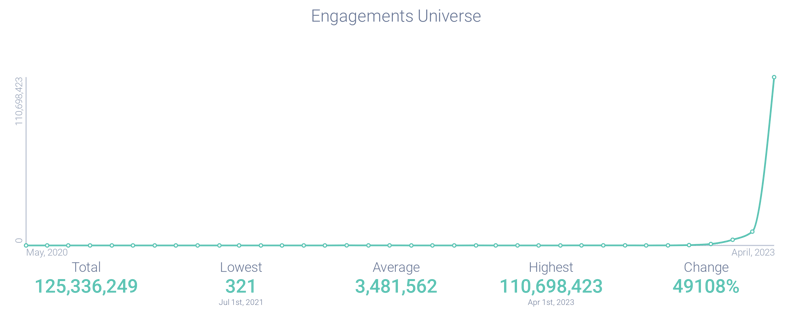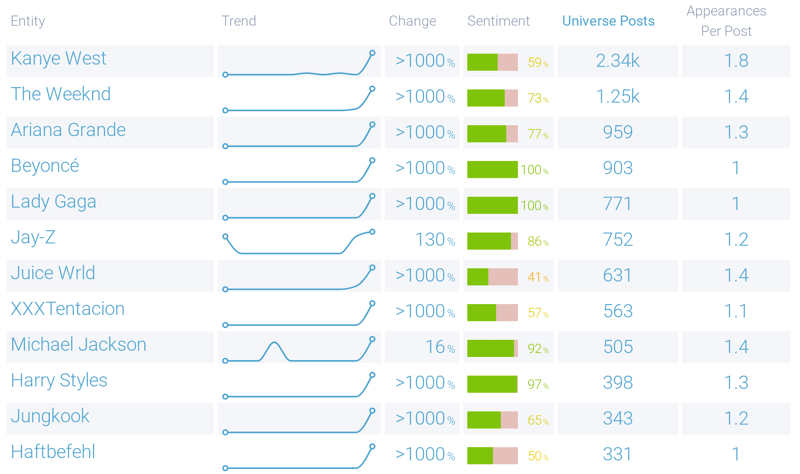Share this
AI-Generated Music: Social Reaction and Industry Impact
by Henry Chapman on June 12, 2023
Social listening’s reaction to the rise of AI-generated songs
AI-generated covers have exploded into contemporary consciousness, evoking universally positive sentiments and emotions among listeners. We corroborate this claim with social listening data to show how internet users are ecstatic about the newfound ability to resurrect their favorite artists or create unprecedented music and genre fusions. While those changes seem laudable at first, using Narratives, we uncovered concerns within the music industry and among artists themselves. These insights emphasize the necessity for thoughtful deliberation and the establishment of clear guidelines to navigate the intricate intersection of AI, music, and intellectual property rights.
How can computers "write" music?
Recent developments in AI have begun a music revolution. Computers can analyze artists' musical patterns, styles, and characteristics by leveraging deep learning techniques. AI–based tools can learn to mimic their unique musical expression by training on a vast catalog of the artists' discographies. AI models can then generate new covers that capture the essence of the original artist while infusing new elements and interpretations. These new covers can experiment with different genres, instrumentation, tempo, and vocal styles to create fresh and compelling renditions of classic songs.
Kanye West's “Hey There Delilah”
AI-generated covers began a few months ago with known artists "performing" well-known covers. The best example of this is a cover of "Hey There Delilah," initially released by The Plain White Tees in 2006 but "performed" by Kanye West. Since these models are so good, it's tough to tell that Kanye didn't sing this (You be the judge and listen for yourself!). Social media users agreed and noted that the cover seemed "real."

Figure 1: Topics associated with "Kanye's" Hey There Delilah Performance (February 2023 - May 2023); Infegy Atlas data.
Bringing passed artists back: Juice WRLD's Midnight
Once internet users discovered they could cover living artists, it didn't take long for them to start using artists' voices that have passed on. Because large language models don't discriminate on whether the training data comes from living or deceased artists, the pipeline and process for generating new music are the same.
Perhaps the best-known song is a new piece by MOSH in the style of Juice WRLD, a rapper killed by a drug overdose in Los Angeles in 2019. MOSH, a YouTuber with a small subscriber count, wrote the lyrics and composed the beat himself. He then put the lyrics into a trained model and created Midnight (ft. Lil Uzi Vert & The Kid Laroi).
AI music experiencing exponential growth
The realm of AI-generated music and covers has experienced exponential growth in recent weeks, captivating audiences worldwide. Infegy Atlas tracks AI-related music growing 874% over the last three years, with most of that growth occurring in the previous 4 months. This coincides with the surge of interest in Artificial Intelligence on social media. AI-related topics grew 87% over the same time period.

Figure 2: Post volume associated with AI-generated music (May 2020 - May 2023); Infegy Atlas data.
More interesting than just the post-growth is the astonishing level of social media engagement (likes, shares, and retweets). Infegy Atlas shows that Engagement, as opposed to post volume, has grown 49,108% with no signs of letting up, with 110,698,423 engagements in April 2023 alone. The attention and excitement surrounding these AI-generated compositions have been extraordinary. Whether it's the uncanny revival of legendary artists or the seamless blending of genres, AI-generated music's sheer novelty and creativity has left audiences in awe and craving for more.

Figure 3: Engagements associated with AI-generated music (May 2020 - May 2023); Infegy Atlas data.
Using Entities to detect which artists are most covered
After examining the remarkable growth of AI-generated music, it is worth exploring the specific artists and bands that have garnered the most attention regarding covers. Using Infegy Atlas' Entities feature, we looked for proper nouns in AI-generated music conversation. We discovered that Kanye West had the highest Universe count, closely followed by The Weeknd and Ariana Grande. In a fascinating twist, we also observed the emergence of new covers and songs featuring Michael Jackson alongside deceased artists like Juice Wrld. Despite his passing in 2009, Jackson's enduring influence continues to resonate in popular culture and today's music landscape.

Figure 4: Top Entities associated with AI-generated music (May 2020 - May 2023); Infegy Atlas data.
Music listeners react with high sentiment
Now that we've looked at the explosive post volume growth and specific artists that are popping up in the context of AI-generated songs, we'll next look at how social media users are feeling about this new technology. We did this in three ways. First, we looked at the growth of positive documents, which reflects the exponential growth we uncovered before and shows how much of that growth is positive. At the growth's peak in April 2023, we can see that almost 80% of the documents are positive.

Figure 5: Sentimental documents associated with AI-generated music (May 2020 - May 2023); Infegy Atlas data.
Next, we looked at aggregated emoji, which social media users use most frequently when discussing AI-generated songs. Most popular was 🔥, followed by 🤯. These reflect the positivity that we looked at before but also gets a bit deeper into the nuance of the emotional reaction that social media users had.

Figure 6: Emoji's associated with AI-generated music (May 2020 - May 2023); Infegy Atlas data.
Finally, we'll dig a little bit deeper into that emotional reaction. Trust is the top-performing Emotion, which might seem slightly perplexing. However, Infegy's Emotional analysis records both positive and negative emotions. Much of this Trust post volume is negative Trust, which manifests as disbelief with sentences like "I can't believe" or "That's not possible." The next most frequent Emotion was Joy, which social media users emoted in the more traditional sense.

Figure 7: Emotions documents associated with AI-generated music (May 2020 - May 2023); Infegy Atlas data.
Using Infegy's Narratives to detect a more nuanced discussion
After examining the explosive positive growth of AI-generated music, we can delve into a more nuanced understanding of the pros and cons associated with this transformative technology using Infegy's Narratives. Within this forward-thinking conversation, two distinct clusters emerge. The green cluster in the top left encompasses keywords such as "future of music," "artists," "musicians," and "music industry." These discussions highlight the significant disruption AI-generated music poses to the industry. Artists like Kanye, who once regarded their presence and unique voice as valuable assets, now face the potential diminishment of their role. Previously, creating a Kanye song necessitated Kanye himself, but that dynamic is shifting with the advent of LLM and AI-generated music.
On the other hand, the orange cluster in the top left, as revealed by Narratives, focuses on topics such as "music production," "songwriting," and "#musicproducer." These discussions shed light on how AI-generated songs present challenges for artists but present a remarkable opportunity for music producers and songwriters. Traditionally, artists received the lion's share of attention, fame, and financial rewards in the music industry. At the same time, the contributions of songwriters and producers often went under-compensated, despite their work on hit songs. AI-generated music, however, empowers smaller producers who have historically been overlooked, effectively shifting the balance of power away from established artists and towards these other creative talents.

Figure 8: Narratives associated with AI-generated music (May 2020 - May 2023); Infegy Atlas data.
Conclusion
The rise of AI-generated music has been met with explosive growth and overwhelming positivity from music enthusiasts worldwide. The ability to resurrect favorite artists and explore innovative music fusions has captivated audiences, resulting in an astonishing level of engagement and excitement. However, as we delve deeper into the implications of this technology using Infegy's Narratives, concerns within the music industry and among artists themselves come to light. The disruption caused by AI-generated music challenges the traditional role of artists while providing new opportunities for music producers and songwriters. The delicate balance between intellectual property rights, ownership of AI-generated compositions, and the recognition of creative contributions warrants careful consideration and the establishment of clear guidelines. As the realm of AI-generated music continues to expand, it is crucial to navigate this intersection with thoughtful deliberation to ensure a harmonious coexistence between AI and human creativity in the ever-evolving landscape of popular music.
Key Takeaways
AI-Generated Music Revolution
AI-generated music is reshaping the industry, offering unprecedented music fusions and reviving legendary artists, triggering excitement and robust social media engagement.
Exponential Growth of AI Music
AI music exploded 874% in recent years, driven by interest in AI, with social media engagement ballooning by 49,108%.
The Future of AI in Music
Balancing AI innovation and intellectual property rights is crucial. Clear guidelines are needed to harmonize AI and human creativity in music's evolving landscape.
Share this
- December 2025 (2)
- November 2025 (2)
- October 2025 (3)
- September 2025 (2)
- August 2025 (2)
- July 2025 (3)
- June 2025 (3)
- May 2025 (4)
- April 2025 (2)
- March 2025 (1)
- February 2025 (4)
- January 2025 (1)
- December 2024 (2)
- November 2024 (2)
- October 2024 (4)
- September 2024 (2)
- August 2024 (2)
- July 2024 (2)
- June 2024 (2)
- May 2024 (2)
- April 2024 (2)
- March 2024 (2)
- February 2024 (2)
- January 2024 (2)
- December 2023 (3)
- November 2023 (3)
- October 2023 (4)
- September 2023 (4)
- August 2023 (4)
- July 2023 (4)
- June 2023 (3)
- May 2023 (5)
- April 2023 (3)
- March 2023 (7)
- February 2023 (3)
- January 2023 (4)
- December 2022 (2)
- November 2022 (3)
- October 2022 (4)
- September 2022 (2)
- August 2022 (3)




.png?width=64&height=64&name=linkedin%20(1).png)